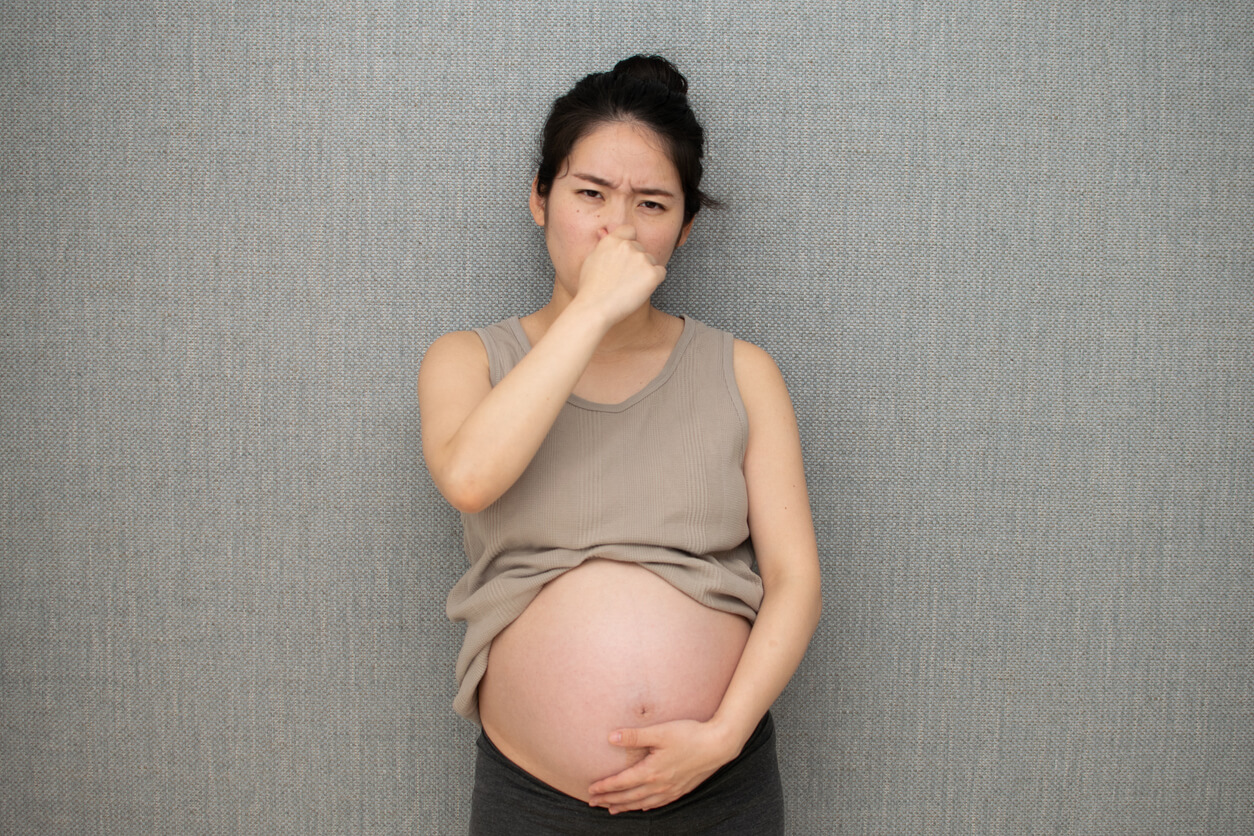Sensitivity to Odors During Pregnancy: What You Need to Know


Written and verified by the doctor Sandra Golfetto Miskiewicz
It’s common for women to experience increased sensitivity to odors during pregnancy, known as hyperosmia. A study of pregnant women even revealed that approximately 60% of them were nauseated by certain everyday aromas. But the question for many expectant mothers is whether this is a gestational change or a sensory issue. Keep reading and find out the answer.
Why is there an increased sensitivity to odors during pregnancy
There’s some controversy about hyperosmia, and scientists have developed several hypotheses to try to explain the most likely cause. Here are some of them.

The adaptation theory
According to a paper published in the 1990s, it was postulated that morning sickness and vomiting during pregnancy are an adaptive and defense mechanism. This work suggested that in the first trimester, when the embryo is most vulnerable to toxins, these symptoms would protect it from potentially teratogenic or abortifacient substances.
The pregnant woman’s olfactory sensitivity decreases over time, while the fetus’s need for nutrients increases. This stimulates the mother to increase the intake of nutrients, such as vitamins and minerals, to meet the requirements of the future baby.
The theory on the cognitive relationship and hormonal factors
Other scientists argue that pregnant women’s sensitivity to odors occurs because of physiological changes in the first trimester of pregnancy. Also, they found that toward the end of gestation and up to 6 to 8 weeks postpartum, many mothers experienced changes in olfactory sensitivity, either less (hyposmia) or more (hyperosmia).
The factors involved in these physiological changes are as follows:
- Hormonal factors: The increase in hCG (human gonadotropin hormone) and thyroid hormones could influence the appearance of this phenomenon, as well as alterations in liver function or gastric infection by the bacterium Helicobacter pylori.
- Cognitive factors: The possibility of a psychological aspect in which the mother presents repressed or unconscious feelings of rejection or ambivalence towards the fetus that’s developing.
“Pregnancy doesn’t modify the sense of smell”
Some more recent works insist that there are no significant changes in sensitivity to odors during pregnancy. In this regard, experts report that odor perception doesn’t differ from that of non-pregnant women or men. However, they don’t rule out the possibility that morning sickness and vomiting could have a protective effect on the embryo.

Whatever the explanation…
Whatever the scientific explanation for olfactory sensitivity may be, the mother-to-be should always be aware of the consumption of foods or substances that are potentially harmful to her or her baby. In this regard, it’s essential to seek advice from your gynecologist in case you have any doubts.
Obstetric evaluation is important, especially if there’s any chronic or recently acquired disease that alters the mother’s senses.
Tips to reduce the discomfort caused by hyperosmia
As we’ve seen, sensitivity to odors in pregnancy can be very annoying. However, it can be reduced with a few simple tricks, such as avoiding the consumption of highly seasoned dishes, selecting low-fat foods that don’t emanate strong odors, limiting the use of artificial air fresheners, and ventilating the rooms of the house every day.
It’s common for women to experience increased sensitivity to odors during pregnancy, known as hyperosmia. A study of pregnant women even revealed that approximately 60% of them were nauseated by certain everyday aromas. But the question for many expectant mothers is whether this is a gestational change or a sensory issue. Keep reading and find out the answer.
Why is there an increased sensitivity to odors during pregnancy
There’s some controversy about hyperosmia, and scientists have developed several hypotheses to try to explain the most likely cause. Here are some of them.

The adaptation theory
According to a paper published in the 1990s, it was postulated that morning sickness and vomiting during pregnancy are an adaptive and defense mechanism. This work suggested that in the first trimester, when the embryo is most vulnerable to toxins, these symptoms would protect it from potentially teratogenic or abortifacient substances.
The pregnant woman’s olfactory sensitivity decreases over time, while the fetus’s need for nutrients increases. This stimulates the mother to increase the intake of nutrients, such as vitamins and minerals, to meet the requirements of the future baby.
The theory on the cognitive relationship and hormonal factors
Other scientists argue that pregnant women’s sensitivity to odors occurs because of physiological changes in the first trimester of pregnancy. Also, they found that toward the end of gestation and up to 6 to 8 weeks postpartum, many mothers experienced changes in olfactory sensitivity, either less (hyposmia) or more (hyperosmia).
The factors involved in these physiological changes are as follows:
- Hormonal factors: The increase in hCG (human gonadotropin hormone) and thyroid hormones could influence the appearance of this phenomenon, as well as alterations in liver function or gastric infection by the bacterium Helicobacter pylori.
- Cognitive factors: The possibility of a psychological aspect in which the mother presents repressed or unconscious feelings of rejection or ambivalence towards the fetus that’s developing.
“Pregnancy doesn’t modify the sense of smell”
Some more recent works insist that there are no significant changes in sensitivity to odors during pregnancy. In this regard, experts report that odor perception doesn’t differ from that of non-pregnant women or men. However, they don’t rule out the possibility that morning sickness and vomiting could have a protective effect on the embryo.

Whatever the explanation…
Whatever the scientific explanation for olfactory sensitivity may be, the mother-to-be should always be aware of the consumption of foods or substances that are potentially harmful to her or her baby. In this regard, it’s essential to seek advice from your gynecologist in case you have any doubts.
Obstetric evaluation is important, especially if there’s any chronic or recently acquired disease that alters the mother’s senses.
Tips to reduce the discomfort caused by hyperosmia
As we’ve seen, sensitivity to odors in pregnancy can be very annoying. However, it can be reduced with a few simple tricks, such as avoiding the consumption of highly seasoned dishes, selecting low-fat foods that don’t emanate strong odors, limiting the use of artificial air fresheners, and ventilating the rooms of the house every day.
All cited sources were thoroughly reviewed by our team to ensure their quality, reliability, currency, and validity. The bibliography of this article was considered reliable and of academic or scientific accuracy.
- Ochsenbein-Kölble N, von Mering R, Zimmermann R, Hummel T. Changes in olfactory function in pregnancy and postpartum. 2007;97(1), 0–14. doi:10.1016/j.ijgo.2006.12.009
- EL Cameron. Pregnancy and olfaction: a review. Front. Phychol. 2014;67(5). DOI: https://doi.org/10.3389/fpsyg.2014.00067
- Swallow B et al. Smell perception during early pregnancy: no evidence of an adaptive mechanism. BJOG An International Journal of Obstetrics & Gynaecology. 2005;112(1):57-62. DOI: 10.1111/j.1471-0528.2004.00327.x
- EL Cameron. Pregnancy Does Not Affect Human Olfactory Detection Thresholds. Chem. Senses. 2014; 39: 143–150. doi:10.1093/chemse/bjt063
- Cardwell M. Pregnancy sickness: a biopsychological perspective. Obstet Gynecol Surv. 2012 Oct;67(10):645-52. doi: 10.1097/OGX.0b013e31826ff6c5.
This text is provided for informational purposes only and does not replace consultation with a professional. If in doubt, consult your specialist.








